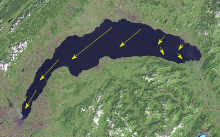Bise
From Wikipedia, the free encyclopedia
For other uses, see Bise (disambiguation).
France
In France, the bise is a northern wind, cold and generally dry. It may also refer to a traditional French greeting among close friends and family members. It consists of two, three, or four kisses on the cheek. The number depends on the region where the person lives.
Switzerland

Bise on Lake Geneva
In Switzerland the bise blows from the north-east, above all during the winter months, and is due to a high-pressure cell north-west of Switzerland.[1] The effects of the bise are strongest in Geneva, situated in a narrow passage between the Jura mountains in the West and the Alps in the South. Many foreign travellers to this Swiss city have commented upon it.[2][3]
Etymology
The term entered Middle English from French bise. Its origin is unknown.[4]
References
- ↑ Martin Beniston, From Turbulence to Climate: Numerical Investigations of the Atmosphere, Springer 1998, ISBN 3-540-63495-9, p.186
- ↑ Fredrika Bremer, Two Years in Switzerland and Italy, Hurst and Blackett 1861, p.258
- ↑ The Century: A Popular Quarterly by Making of America Project, The Century Co. 1909, p.463
- ↑ W. R. Trumble; A. Stevenson, eds.,Shorter Oxford Dictionary, Oxford University Press 2002
This article is issued from Wikipedia. The text is available under the Creative Commons Attribution/Share Alike; additional terms may apply for the media files.